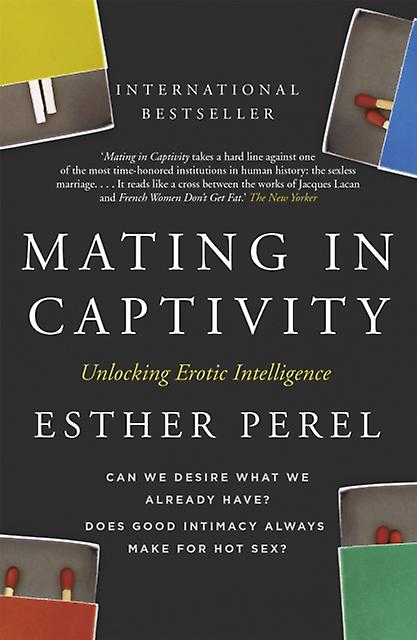“Love enjoys knowing everything about you; desire needs mystery.”
“Mating in Captivity: Unlocking Erotic Intelligence” by Esther Perel is a thought-provoking exploration into the complex dynamics of desire and intimacy within long-term relationships. This book delves into the paradoxical relationship between domesticity and sexual desire, and how maintaining an erotic connection requires more than just love.
In a world where we live more as couples, and that relationship is supposed to cover so many needs from both sides of both partners, it’s a book about the importance of balancing
It’s a book about the tension between the need for connection and the need for freedom.
Love, Friendship, Stability and Security Vs Mystery, Desire, Attraction, Lust

Love = Accepting, Closeness, Knowing, Friendship, Appreciating, Having, Giving, Working to Give
Attraction = Mystery, Individuality, Uncertainty, Wanting, Challenging, Working to Get
You want what you can’t have.
You can’t love something you don’t know.
You can’t be infatuated by something that you can predict.
Two magnets are attracted to each other. When they are together, they are at rest. There is no longer any need for each other. To feel the attraction, it’s necessary to sometimes move the magnets away from each other sometimes. It’s important to have some separation, and to vary the amounts of closeness and individuality.
The central theme of the book is how, in the early stages of a relationship it’s all about attraction, desire, and mystery, and as the relationship progresses, it moves more towards love, friendship, stability, and security. At the same time, it can often feel like something has been lost – that mystery, attraction, desire and lust. But we still have the human need for it. But that this attraction and lust can be revitalised by absence, by accepting some more mystery, uncertainty. We can move more towards the right side. We can go between the two.
For much of our human history, we were not designed to live together as a couple in small spaces in cities. We were designed to live in nomadic groups or societies. Often the community would have provided more of the support, stability and security that we now expect from our relationship. At the same time, the men would spend more time away, as part of a hunt.
The book examines the challenges of sustaining desire in committed relationships, offering insights to rekindle passion through maintaining individuality and erotic intelligence.
It explores the concept of the importance of space in a relationship, of managing between individuality and oneness.
Chapters Summary
- Introduction: Sets the stage by discussing the paradox of sex and domesticity.
- Can Love Last?: Explores how modern expectations of marriage impact desire.
- The Pitfalls of Modern Intimacy: Analyzes how the quest for emotional closeness can dampen erotic desire.
- Democracy versus Hot Sex: Discusses the tension between egalitarianism in partnership and the need for dominance and submission in sex.
- The Shadow of the Third: Examines the role of fantasy and others in sustaining desire.
- Bringing Sex Back: Offers practical advice for reigniting the sexual spark within a relationship.
Powerful Quotes
- “Love enjoys knowing everything about you; desire needs mystery.”
- “Erotic intelligence is about creating distance, then bringing that space to life.”
- “When intimacy collapses into fusion, it is not a lack of closeness but too much closeness that impedes desire.”
- “To sustain desire for one another, we must be able to sustain a certain level of anxiety.”
- “Sex isn’t something you do, it’s a place you go.”
- “Commitment doesn’t mean ‘I will love you forever because you are all that I need’. It means ‘I have chosen you and I will keep choosing you’.”
- “Desire is rooted in absence and longing: a wanting for what we cannot fully have.”
- “In love, we feel the having, the closeness, the belonging. In desire, we want something else, something unpredictable and unfamiliar.”
- “Fantasy is not the opposite of reality; it is what reality forecloses and, as such, it is a vital clue to what is missing.”
- “The risk of betrayal is inherent to the desire for something new and unknown.”
Book Review
“Mating in Captivity” stands out as a seminal work that challenges conventional wisdom on the sustainability of passion in long-term relationships. Esther Perel, with her insightful and candid exploration, offers a new lens through which to view intimacy and desire, making a compelling case for the importance of maintaining individuality, embracing uncertainty, and cultivating erotic intelligence. The book is both a guide and a philosophical treatise, weaving together case studies, cultural analysis, and psychological theory to provide readers with practical strategies for reconciling the seemingly incompatible needs for security and adventure in love.
One of the most intriguing lessons from the book is the idea that eroticism in a relationship thrives on the tension between the need for connection and the need for freedom. Perel argues that sustaining desire in a relationship is not so much about sex per se but about maintaining the erotic space between partners.
The Author
Esther Perel is a Belgian psychotherapist and writer known for her work on human relationships. She brings a multicultural perspective to her writing and therapy practice, influenced by her background in clinical psychology, art therapy, and psychodrama. Perel has gained international acclaim for her innovative insights into couples’ dynamics and sexual intimacy.
Main Critiques
- Oversimplification: Some argue that the book simplifies complex relationship dynamics.
- Lack of Diverse Perspectives: Critiques include a call for broader representation of non-Western, non-heteronormative relationships.
- Insufficient Emphasis on Emotional Connection: Critics say it underplays the importance of emotional intimacy in sexual desire.
- Practical Application: Some readers find the advice challenging to implement.
- Controversial Opinions: Certain views on monogamy and infidelity may not resonate with all.
- Anecdotal Evidence: The reliance on case studies is seen as not universally applicable.
- Focus on Long-term Relationships: There’s a perception of limited relevance for those not in long-term partnerships.
- Psychological Depth: A desire for deeper exploration of the psychological underpinnings of desire.
Related Books
- “The State of Affairs: Rethinking Infidelity” by Esther Perel: Offers further exploration into infidelity and monogamy.
- “Come as You Are” by Emily Nagoski: Explores the science of sex and what it means for women.
- “The Erotic Mind” by Jack Morin: Delves into the psychology of sexual desire and fulfillment.
- “Sex at Dawn” by Christopher Ryan and Cacilda Jethá:
